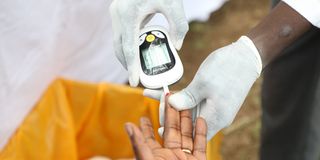Growing concern over beauty products linked to kidney disease

A test being conducted during the World Kidney Day in Nakuru.
Doctors in Nakuru have raised concerns about potential health risks associated with chemicals found in beauty products that are believed to cause kidney disease.
Some chemicals in beauty products, when absorbed through the skin or ingested, can pose a risk to kidney health.
However, Dr Daniel Wainaina, Director of Medical Services, says the true extent of the risk is not yet fully understood as more research needs to be done.
"It is true that more research is needed to better document the burden of complications that can be caused by beauty products," he says, pointing out that certain products that previously contained harmful substances such as mercury and other heavy metals have already been banned due to their known link to health complications.
Kidney complications are more often linked to other underlying non-communicable diseases (NCDs) such as hypertension and diabetes, which are also on the rise.
"The county has been proactively addressing the rising burden of kidney disease and its contributing factors through a number of initiatives aimed at educating the public and providing free screening to detect these conditions early and prevent complications," says Dr Wainaina, urging residents to take advantage of the ongoing free one-month screenings for diabetes, hypertension and kidney disease being offered at various public health facilities across the county.
Speaking during the global celebration of World Kidney Day - themed 'Are your kidneys OK? Catch it early, protect your kidney health', Dr Wainaina highlighted how late screening and diagnosis exacerbates the problem.
"These screenings are crucial because they help identify people at risk before complications develop, reducing the need for dialysis or other serious interventions," says Dr Wainaina.
Despite county's efforts to create awareness Dr Wainaina notes that only people over the age of 50 are the most likely to be screened.
"We especially encourage young people to come. While kidney disease is more common in the elderly due to age and other NCDs, we also have diseases that affect young people, including children. We do not want to leave anyone behind, so we have set up youth-friendly centres where young people can come for screening," says Dr Wainaina.
According to the county, the disease burden is significant, with about 30,000 people living with hypertension and diabetes. Between eight and 10 per cent of the total adult population has diabetes, but unfortunately less than half of them have been diagnosed.
As for hypertension, about 18 percent of the adult population in Nakuru is living with it. Unfortunately, only a fraction of them are aware of their condition, with many only discovering it when they are in a coma, collapse or have a stroke.
"This means that many people are walking around unaware of their condition until they develop complications. That is why it is so important to get screened, not just this week, but whenever possible," says the Medical Director.
The screening tests are friendly, non-invasive and quick, with results available in as little as three minutes or less than ten minutes, and include a free glucose check for diabetes, a free urine test to check kidney function and blood pressure screening.
